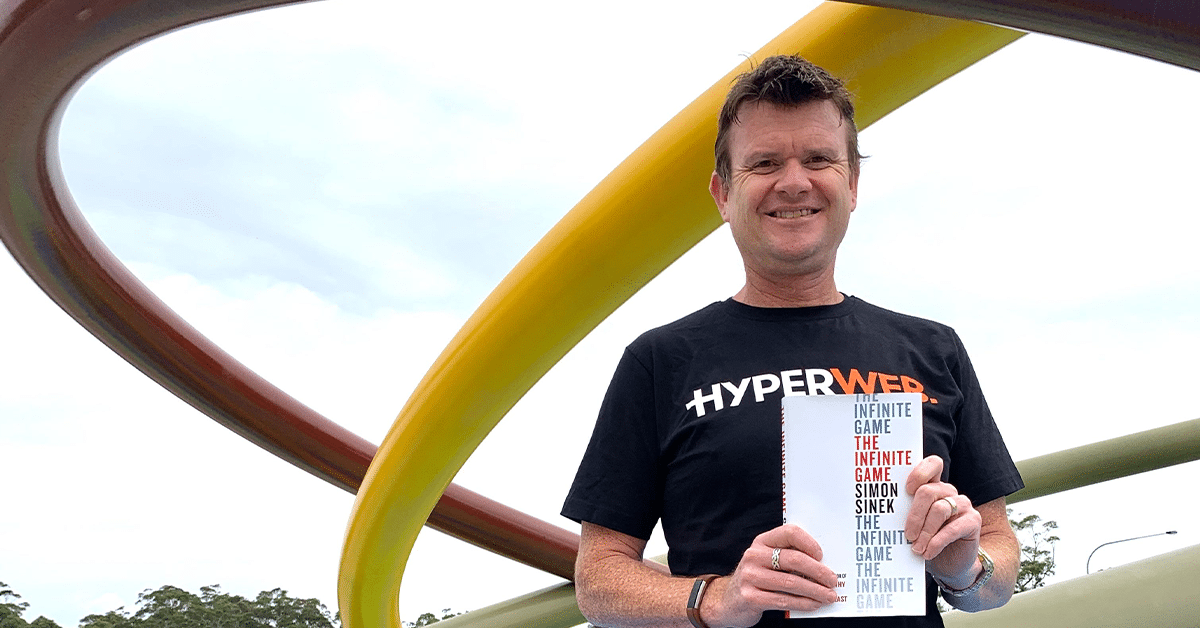Simon Sinek wrote The Infinite Game for business owners and leaders because business isn’t a finite game like sport. Finite games have a fixed and agreed upon objective. The game ends when that objective is reached. The rules are also known and agreed upon as well as the techniques and skills required to take part. Simon Sinek picks up on the common misconception held by many leaders that business too is a finite game. They believe that there is an endpoint to win, this is driven by the former well held definition of a corporation which is to increase the value to shareholders.
It derives somewhat from James P Carse Finite and Infinite Games and (at least for me) also evokes Dr Carol Dweck’s Mindset and develops them further in terms of corporate social responsibility, leadership, and business strategy.
The Infinite Game is a call to business owners and leaders to see business as an infinite game with objectives beyond profit. Whilst there are legal rules, there is no standard way of operating within them. There is no full-time siren or possibility of winning, so the goal is to stay in the game for as long as possible. Playing the infinite game means gearing up to handle what the business environment throws at you. Not being blinkered and focussed solely on profit means we can be agile and innovative and provide greater value.
Sinek sets out five essential practices for playing the Infinite Game:
- Advance a Just Cause
- Build Trusting Teams
- Study your Worthy Rivals
- Prepare for Existential Flexibility
- Demonstrate the Courage to Lead
Similar to Start With Why, the Just Cause is the foundation of all the practices. It is the one thing that drives decision making within each. It is something that is inclusive, has outward impact on people, and serves to inspire commitment to playing the infinite game. A Just Cause isn’t a goal or a result, it isn’t an end. The Just Cause is what drives the means. A Just Cause leads decision makers to consider staff, customers, the environment, and social equity before profit when making decisions around cost savings.
At times, particularly when reading a lot of this book in a short amount of time, the terminology starts to feel like an exercise in phrase coining. It’s one of my only criticisms of the content. I feel the author makes up a phrase to describe something that is easily understood with existing phrases. An example is in the second essential: Build Trusting Teams. Within this, Sinek talks about Ethical Fading. Ethical Fading really is normalised unethical behaviour, often influenced from the top down. Over time ethical behaviour based as unethical behaviour becomes gradually excepted as part of a team culture. Obviously, a bad thing. Building a trusting team means transparency and openness, encouraging the sharing of concerns with no pressure to hide or suppress issues that should ethically be brought to the surface.
What resonated with me the most was the third essential practice, Study your Worthy Rivals. Rather than seeing your competition as being antagonists out to get you, or beat you into insolvency, choose a competitor as a rival worthy of study. You can learn from their actions, compare your strengths and weaknesses, and be inspired to improve. In a finite game, rival battle to win or lose, in an infinite game, rivals drive each other, and both succeed.
The fourth essential practice, Prepare for Existential Flexibility, is another bit of phrase coining. This is really, self-initiated disruption, or a pivot, that can change the playing field. Similar to the Blue Ocean Strategy if you are familiar with that. It is about being open to taking huge risks or strategic moves to completely change a product or service and transform it into something that alters the competitive landscape for that product or service in your favour.
Lastly, Demonstrating the Courage to Lead underscores all of the above, framing the Just Cause, leading by example, having the willingness to take risks, and being brave enough to put people before profit.
As always, Sinek writes very clearly, and with a clear structure. The examples of companies that help build his concepts are very well known which makes it easy to understand and develop empathy with these eminent business leaders.
The book contains many highlights, though felt a bit drawn out toward the end. It finishes off well with a great and inspiring set of messages. While at times, a bit reminiscent of Carol Dweck’s Mindset dichotomy of Fixed and Growth Mindset, it extends upon it in that an infinite mindset goes beyond growth, but towards a never-ending commitment to a purpose. As mentioned earlier, at times it felt like it was an exercise in coining terms and concepts, by giving existing concepts new names. However, I really enjoyed it and found it very valuable. The Infinite Game is another one of Simon Sinek book well worth reading, it helps you consider your own business leadership, and put what works for you into play. I hope many businesses implement these practices.




